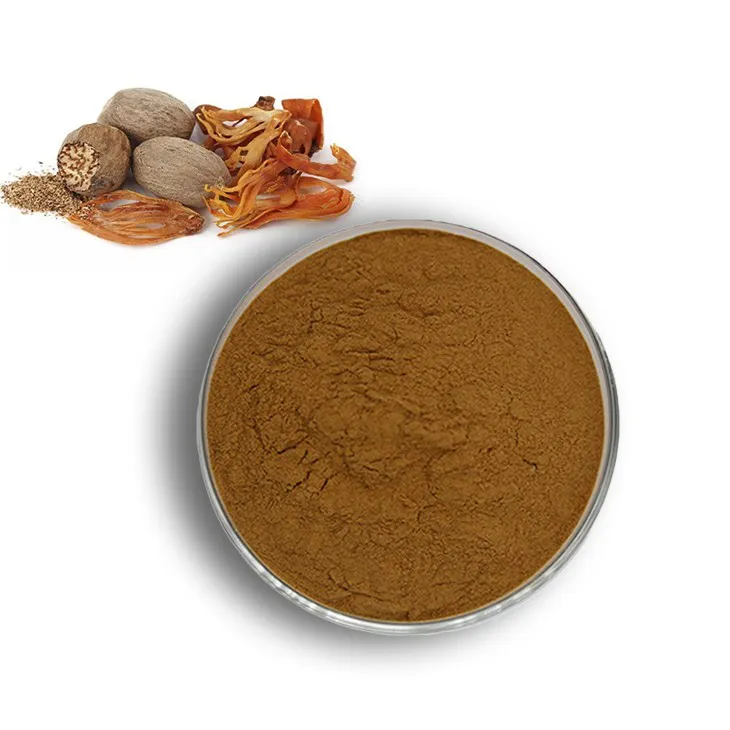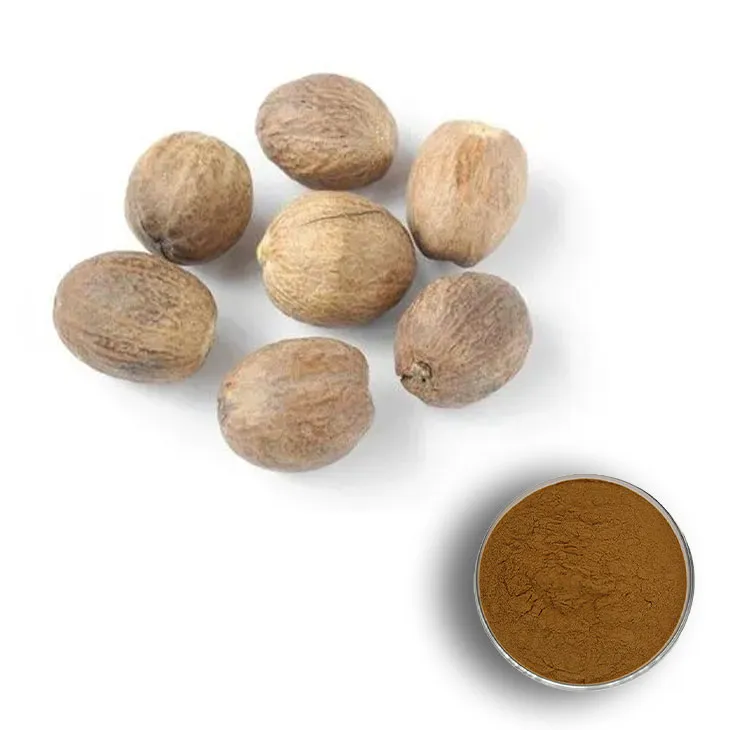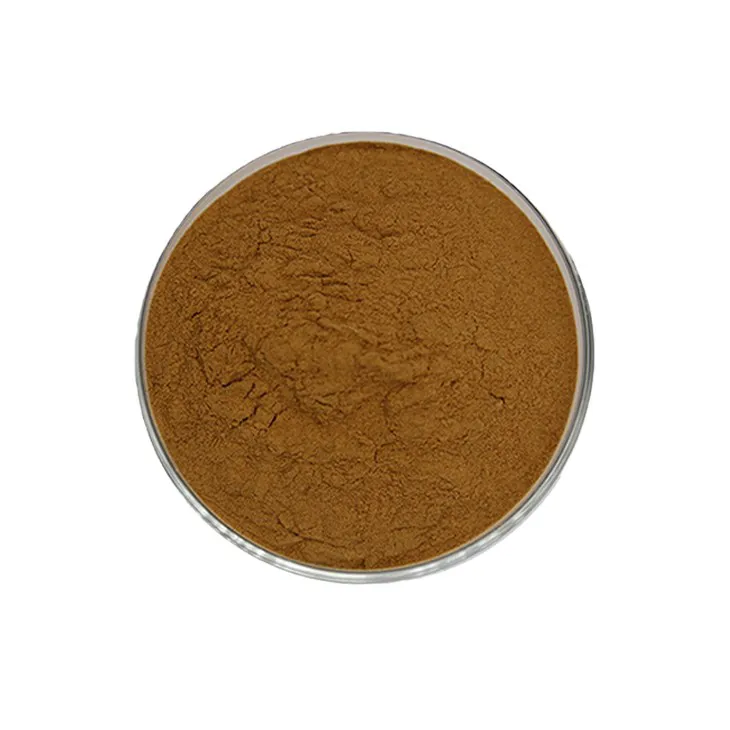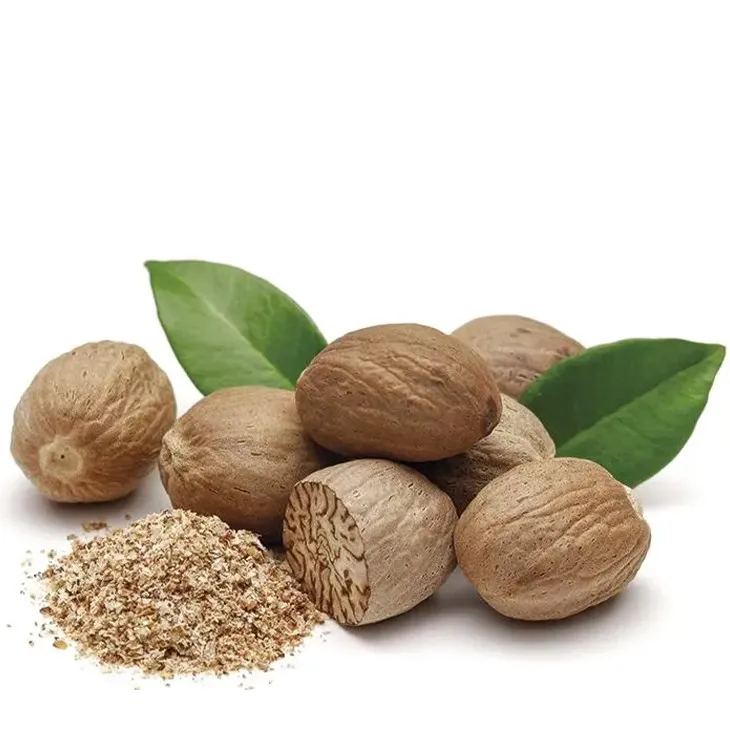- 0086-571-85302990
- sales@greenskybio.com
From Seed to Syrup: The Art and Science of Nutmeg Extract Production
2024-07-04

1. Introduction
Nutmeg, a spice that has been cherished for centuries, is more than just a flavor enhancer in our kitchens. It holds a world of potential, especially when it comes to the production of its extract in the form of syrup. This journey from a simple seed to a complex and valuable syrup is a fascinating blend of art and science. Understanding this process not only sheds light on the culinary and commercial aspects of nutmeg but also on its applications in various other fields such as medicine and cosmetics.

2. The Origin and Cultivation of Nutmeg
2.1 Geographic Origin
Nutmeg is native to the Spice Islands in Indonesia. These islands, with their unique climate and soil conditions, provide the ideal environment for nutmeg trees to thrive. The warm, humid climate and well - drained soil are crucial factors that contribute to the healthy growth of the trees.
2.2 Cultivation Practices
Cultivating nutmeg trees is a meticulous process. It begins with the selection of high - quality seeds. The seeds are typically planted in nurseries and cared for until they are strong enough to be transplanted. Once transplanted, the young trees require regular watering, protection from pests and diseases, and proper pruning. Pruning is essential as it helps in shaping the tree and promoting better air circulation, which in turn reduces the risk of fungal infections.
- Nutmeg trees are dioecious, meaning there are male and female trees. For successful pollination and fruit production, it is necessary to have a proper ratio of male to female trees in the orchard.
- Fertilization is another important aspect of cultivation. A balanced fertilizer, rich in nitrogen, phosphorus, and potassium, is applied to the soil to ensure healthy growth and high - yield production.

3. Harvesting Nutmeg
3.1 Timing of Harvest
The timing of nutmeg harvest is crucial. The fruits are typically ready for harvest when they turn yellow and start to split open. This usually occurs about 9 months after fertilization. Harvesting too early or too late can affect the quality of the nutmeg seeds and, consequently, the extract produced from them.
3.2 Harvesting Techniques
Harvesters carefully pick the fruits from the trees by hand to avoid damaging the delicate branches. Once harvested, the outer fleshy part of the fruit, known as the aril, is removed. The remaining seed, which is the nutmeg, is then dried. Drying can be done either in the sun or in specialized drying chambers. The drying process is important as it reduces the moisture content of the nutmeg, preventing mold growth and improving its shelf - life.

4. The Science of Nutmeg Extract Extraction
4.1 Solvent Extraction
One of the most common methods of extracting Nutmeg Extract is solvent extraction. In this process, a suitable solvent, such as ethanol or hexane, is used. The dried nutmeg seeds are ground into a fine powder and then mixed with the solvent.
- The solvent penetrates the cells of the nutmeg powder and dissolves the active compounds present in it.
- This mixture is then filtered to separate the solid particles from the solvent - extract mixture. The resulting liquid contains the Nutmeg Extract along with the solvent.
4.2 Steam Distillation
Steam distillation is another popular technique. In this method, steam is passed through the dried nutmeg seeds. The heat from the steam causes the volatile compounds in the nutmeg to vaporize.
- These vapors are then condensed back into a liquid, which is collected. The resulting liquid is the nutmeg essential oil, which can be further processed to obtain the extract.
- Steam distillation is preferred in some cases as it is a more natural process and can produce a purer form of the extract.

5. Conversion into Syrup
5.1 Preparation of the Base
To convert the nutmeg extract into syrup, a suitable base is prepared. This usually involves dissolving a sweetener, such as sugar or honey, in water. The ratio of sweetener to water depends on the desired sweetness of the final syrup product.
5.2 Incorporating the Extract
The nutmeg extract is then added to the sweetener - water base. The amount of extract added is carefully measured to ensure the right flavor intensity. After adding the extract, the mixture is heated gently while being stirred continuously. This helps in homogenizing the mixture and ensures that the extract is evenly distributed throughout the syrup.
5.3 Final Processing
Once the mixture is well - blended, it may be filtered again to remove any impurities. The syrup is then bottled and sealed, ready for use or sale. It is important to store the syrup in a cool, dry place to maintain its quality and shelf - life.
6. The Balance between Science and Tradition
In the production of nutmeg extract syrup, there is a delicate balance between scientific knowledge and traditional art.
- Scientific knowledge provides the understanding of the chemical composition of nutmeg, the optimal extraction methods, and the preservation techniques. For example, modern analytical techniques can identify the specific active compounds in nutmeg and help in determining the most efficient extraction solvents.
- Traditional art, on the other hand, encompasses the age - old practices passed down through generations. These include the traditional ways of cultivating nutmeg, the intuitive sense of when to harvest, and the art of blending the extract into syrup. Traditional producers may have a unique understanding of the flavor profiles and may use methods that have been refined over time but may not be fully understood from a scientific perspective.
7. Applications of Nutmeg Extract Syrup
7.1 In Food
Nutmeg extract syrup has a wide range of applications in the food industry. It can be used as a flavoring agent in baked goods such as cakes, cookies, and pies. The unique flavor of nutmeg adds a warm, spicy note to these treats.
- It can also be used in beverages. For example, a small amount of nutmeg extract syrup can be added to coffee, tea, or hot chocolate to enhance their flavor.
- In the production of ice creams and desserts, nutmeg extract syrup can provide a distinct and appealing flavor.
7.2 In Medicine
Nutmeg has long been associated with certain medicinal properties, and the extract syrup can be used in traditional medicine.
- It may have digestive benefits. Nutmeg is believed to stimulate the digestive system, and the syrup form can be more easily consumed for those with digestive issues.
- Some studies suggest that nutmeg may have anti - inflammatory properties. The extract syrup could be further explored for its potential in treating inflammatory conditions.
7.3 In Cosmetics
In the cosmetics industry, nutmeg extract syrup can be used for its aromatic and potentially beneficial properties.
- The pleasant aroma of nutmeg can be incorporated into perfumes, body sprays, and lotions.
- It may also have skin - conditioning properties. Some cosmetic products may use nutmeg extract syrup to provide a soothing and nourishing effect on the skin.
8. Conclusion
The journey from nutmeg seed to syrup is a complex and multi - faceted process. It combines the agricultural expertise of nutmeg cultivation, the scientific precision of extraction techniques, and the art of conversion into syrup. The balance between science and tradition is crucial in ensuring the quality and diverse applications of nutmeg extract syrup. As research continues and our understanding of nutmeg deepens, we can expect to see even more innovative uses of this remarkable spice extract in the future.
FAQ:
What are the key aspects of nutmeg cultivation in the agricultural process?
Nutmeg cultivation involves several key aspects. Firstly, it requires a suitable climate, typically warm and humid. Nutmeg trees thrive in well - drained soil. Adequate sunlight is also crucial for their growth. They need proper spacing to ensure sufficient air circulation and nutrient uptake. Regular watering and appropriate fertilization are necessary to support their development. Additionally, protection from pests and diseases is an important part of the agricultural process.
What are the precise extraction techniques for nutmeg extract?
There are different extraction techniques for nutmeg extract. One common method is solvent extraction, where solvents like ethanol are used to dissolve the active compounds from the nutmeg. Another technique is steam distillation, which uses steam to carry the volatile components out of the nutmeg. Supercritical fluid extraction is also emerging as a precise method, using supercritical fluids like carbon dioxide under specific pressure and temperature conditions to extract the desired substances from nutmeg.
How is nutmeg converted into syrup?
To convert nutmeg into syrup, first, the nutmeg extract is obtained through extraction techniques. Then, this extract is combined with a suitable sweetener, such as sugar or a sugar substitute. A thickening agent may also be added in some cases. The mixture is then cooked or processed under controlled conditions, with continuous stirring to ensure proper dissolution and homogeneity. This results in the formation of the nutmeg - flavored syrup.
How does the balance between scientific knowledge and traditional art ensure the purity and potency of nutmeg extract?
Scientific knowledge provides accurate measurement and understanding of the chemical composition of nutmeg. It helps in determining the optimal extraction conditions, such as temperature, pressure, and solvent ratios. Traditional art, on the other hand, brings in the experience of generations in handling nutmeg. For example, traditional methods might have a certain way of preparing the nutmeg before extraction that has been proven effective over time. The combination ensures that the extraction process is carried out in a way that maximizes the purity by removing impurities and maintaining the potency of the active compounds in nutmeg.
What are the diverse applications of nutmeg extract in food, medicine, and cosmetics?
In food, nutmeg extract is used as a flavoring agent in various dishes, desserts, and beverages. It adds a warm, spicy flavor. In medicine, it has been associated with properties such as anti - inflammatory, antioxidant, and digestive - aid. It may be used in traditional medicine preparations. In cosmetics, nutmeg extract can be found in products like creams and lotions. It may help in improving skin complexion, and due to its antioxidant properties, it can potentially protect the skin from damage.
Related literature
- Nutmeg: Cultivation and Utilization"
- "The Chemistry of Nutmeg Extracts and Their Applications"
- "Traditional and Modern Extraction Methods of Nutmeg"
- "Nutmeg in Food, Medicine and Cosmetics: A Comprehensive Review"
- ▶ Hesperidin
- ▶ citrus bioflavonoids
- ▶ plant extract
- ▶ lycopene
- ▶ Diosmin
- ▶ Grape seed extract
- ▶ Sea buckthorn Juice Powder
- ▶ Beetroot powder
- ▶ Hops Extract
- ▶ Artichoke Extract
- ▶ Reishi mushroom extract
- ▶ Astaxanthin
- ▶ Green Tea Extract
- ▶ Curcumin Extract
- ▶ Horse Chestnut Extract
- ▶ Other Problems
- ▶ Boswellia Serrata Extract
- ▶ Resveratrol Extract
- ▶ Marigold Extract
- ▶ Grape Leaf Extract
- ▶ blog3
-
Natural grape seed extract
2024-07-04
-
Lycopene
2024-07-04
-
Feverfew Extract
2024-07-04
-
Alfalfa Meal
2024-07-04
-
melatonin extract
2024-07-04
-
Ginger Extract
2024-07-04
-
Oyster Mushroom Extract Powder
2024-07-04
-
Passionflower Extract
2024-07-04
-
American Ginseng Root Extract
2024-07-04
-
Okra Extract
2024-07-04





















